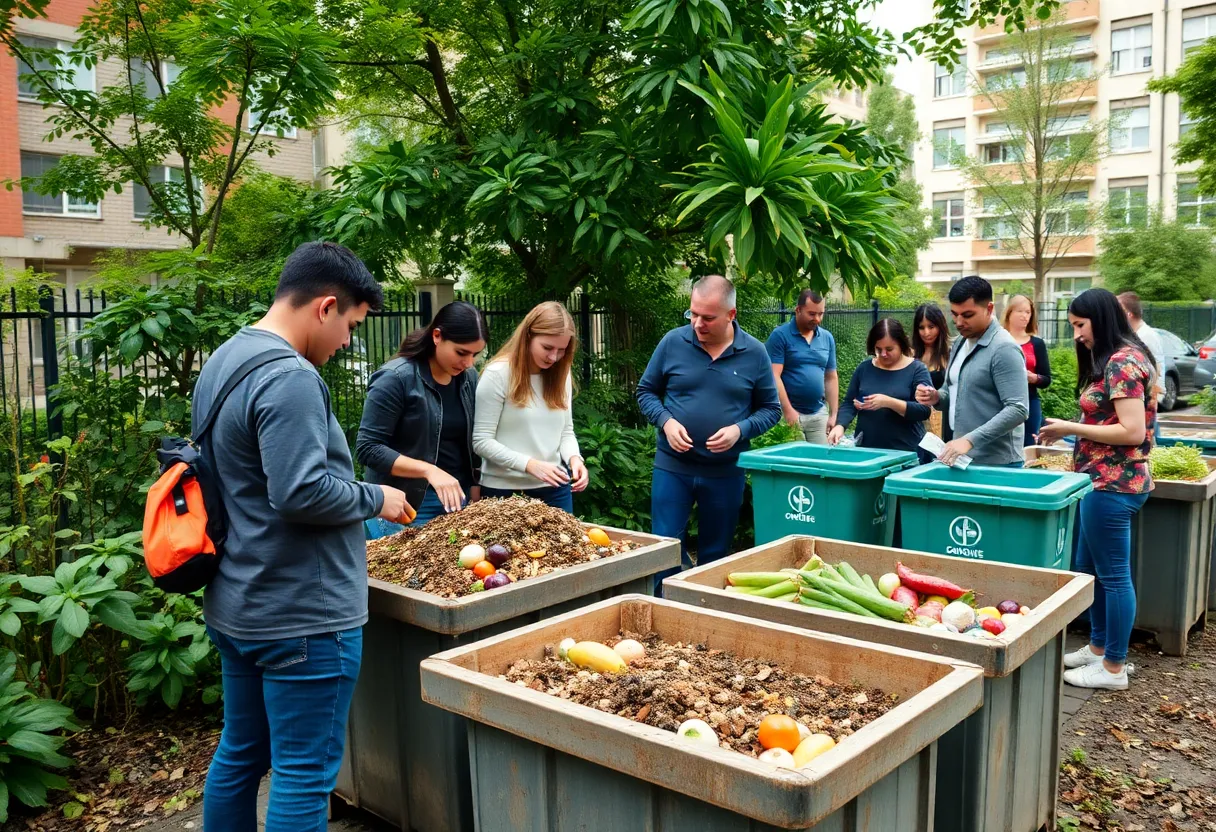News Summary
The Trump administration has halted an $18 million grant to the Rhode Island Food Policy Council, impacting a significant food waste diversion project that aimed to reduce landfill waste. This decision threatens local sustainability initiatives and composting programs while raising concerns among local officials and environmental advocates. The EPA cited funding priorities for the termination, even as critics question the consistency with national environmental goals. Local initiatives continue to strive for sustainability amid this setback, highlighting the urgent need for effective waste management strategies in the state.
Providence, Rhode Island –
The Trump administration has terminated an $18 million grant awarded to the Rhode Island Food Policy Council, effectively halting a significant food waste diversion project aimed at reducing landfill usage in the state. The move impacts efforts to divert over 11,000 tons of food waste from landfills, threatening sustainability initiatives and community composting programs.
The grant was intended to create 27 new local jobs and develop nine compost processing facilities over a three-year period. Initiated on May 1, the decision has raised concerns among local officials and environmental advocates, as it restricts essential efforts to expand food scrap collection services and community composting initiatives throughout Rhode Island.
The Environmental Protection Agency (EPA) cited funding priorities as the reason for the project’s termination, stating it was “no longer consistent” with their objectives. However, this assertion has been met with skepticism by critics who question the decision’s alignment with national environmental goals. The EPA has reportedly terminated a total of 400 contracts and plans to discontinue an additional 781 grants related to environmental justice, impacting numerous programs nationwide.
Local Initiatives and Challenges
While the grant termination creates challenges for food waste management in Rhode Island, local initiatives continue to strive toward sustainability goals. Providence officials announced a $255,850 USDA grant to support composting efforts and educational programs designed to reduce waste. This effort includes enhancing the city’s food waste drop-off network with an allocation of $27,715 to Groundwork RI, an organization focused on community engagement and composting. Groundwork RI has effectively been collecting food scraps from hundreds of households, contributing to soil enhancement while preventing waste.
In addition, the Rhode Island School Recycling Project received over $70,000 to educate students on the importance of reducing food waste within educational settings. Currently, Providence’s waste diversion rate stands at only 8.3%, a stark contrast to the state average of 29.3%, highlighting the urgent need for improved waste management strategies in the city.
Environmental Context
The necessity for sustainable waste management has never been more pronounced, as the U.S. wastes over one-third of its food supply. The decomposition of food in landfills generates significant greenhouse gas emissions, contributing adversely to climate change. Rhode Island’s landfill is nearing capacity, intensifying the urgency for effective waste reduction tactics.
On a related note, the Rhode Island Compost Conference & Tradeshow recently took place at Rhode Island College, underscoring the importance of composting in addressing food waste issues. The event featured several panels, 16 local and regional exhibitors, and an ice cream social, facilitating discussions to inspire food waste generators, composters, and the public. The keynote address was delivered by Domingo Morales and was co-hosted by the Rhode Island Food Policy Council.
Future Directions
In reaction to the limitations posed by the grant termination, Providence officials are examining additional approaches to solve the recycling and waste management crisis. Plans include increasing the size of residential trash carts to minimize contamination in recycling streams. These steps reflect a community-wide call for innovative solutions to enhance Rhode Island’s sustainability efforts amid a shifting federal funding landscape.
As the local community grapples with this setback, the push for environmental sustainability continues. The Rhode Island Food Policy Council and its partners face an uphill battle against growing waste challenges, underscoring the vital need for comprehensive strategies to divert food waste and foster a healthier ecosystem.
Deeper Dive: News & Info About This Topic
HERE Resources
Rhode Island Lawmakers Conclude 2025 Session with Major Reforms
Maria Torres Named Teacher of the Year in Providence
Rhode Island Struggles with Natural Gas Dependency
Rhode Island Shelves Bottle Bill; New Recycling Proposal Emerges
Providence City Council Faces Urgent Deadline on Waste Management Contract
Rhode Island Legislators Debate Proposed Bottle Deposit Bill
Providence Faces Waste Management Crisis Amid Budget Concerns
Derek Wagner Nominated for Best Chef: Northeast Award
Rhode Island Proposes 10-Cent Bottle Deposit Bill
Rhode Island Startup Transforms Seafood Waste into Building Materials
Additional Resources
- Rhode Island Current: $18M Grant Termination
- Providence Journal: Importance of Composting
- Turn to 10: Rhode Island College Compost Conference
- GoLocalProv: $18.7M Award to RI Food Policy Council
- Newport This Week: Food Composting Education Grant
- Wikipedia: Food Waste
- Google Search: Food Waste Management
- Google Scholar: Composting Programs
- Encyclopedia Britannica: Compost
- Google News: Food Waste Management
Author: STAFF HERE PROVIDENCE WRITER
The PROVIDENCE STAFF WRITER represents the experienced team at HEREProvidence.com, your go-to source for actionable local news and information in Providence, Providence County, and beyond. Specializing in "news you can use," we cover essential topics like product reviews for personal and business needs, local business directories, politics, real estate trends, neighborhood insights, and state news affecting the area—with deep expertise drawn from years of dedicated reporting and strong community input, including local press releases and business updates. We deliver top reporting on high-value events such as WaterFire, Rhode Island International Film Festival, and Rhode Island Comic Con. Our coverage extends to key organizations like the Greater Providence Chamber of Commerce and Providence Warwick Convention & Visitors Bureau, plus leading businesses in finance and manufacturing that power the local economy such as Citizens Financial Group and Textron. As part of the broader HERE network, we provide comprehensive, credible insights into Rhode Island's dynamic landscape.





